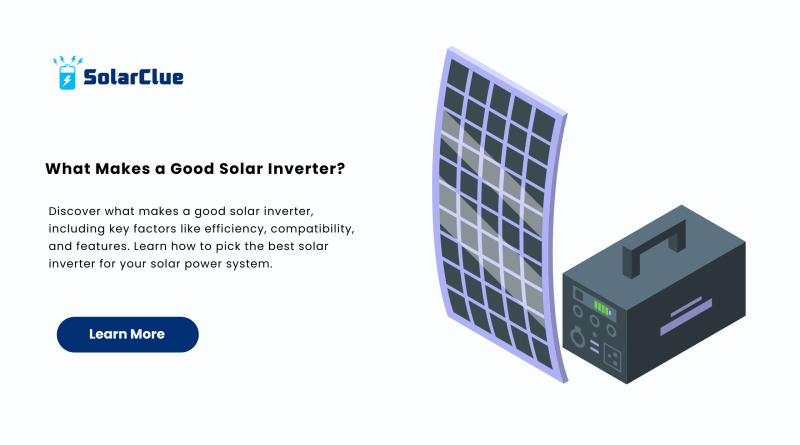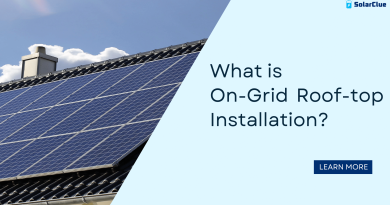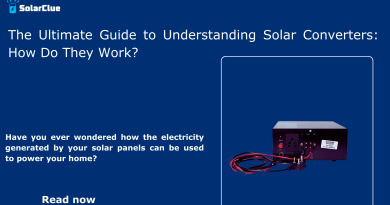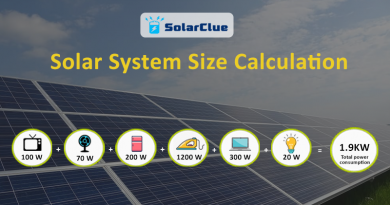What Makes a Good Solar Inverter?
As solar energy adoption grows rapidly, more homeowners and businesses are exploring the best components to build an efficient and reliable solar power system. Among the most crucial components is the solar inverter—a device that converts DC electricity from solar panels into AC electricity used in homes and offices. But what makes a good solar inverter? In this blog, we’ll break down the features and specifications that define the best solar inverter, especially when looking for a reliable solar inverter for home use.
Table of Contents
- 1 Why the Solar Inverter Is So Important
- 1.1 1. High Conversion Efficiency
- 1.2 2. Type of Inverter (String, Micro, Hybrid)
- 1.3 3. Durability and Warranty
- 1.4 4. Smart Monitoring Capabilities
- 1.5 5. Safety Features
- 1.6 6. Noise Level
- 1.7 7. Brand Reputation and Support
- 1.8 8. Grid Compliance and Certifications
- 1.9 9. Scalability
- 1.10 10. Battery Compatibility
- 1.11 11. Cost vs. Value
- 1.12 12. Ease of Installation
- 1.13 13. Local Climate Adaptability
- 1.14 14. Integration With Smart Home Systems
- 1.15 15. Real-World Performance Reviews
- 2 Conclusion
- 3 FAQs
Why the Solar Inverter Is So Important
The solar inverter is often referred to as the “brain” of a solar power system. It manages energy conversion, system performance, and even safety protocols. Without a quality inverter, your solar panels may underperform, and your energy savings may never reach their full potential.
1. High Conversion Efficiency
A major factor that separates a good inverter from a bad one is solar inverter efficiency. The efficiency rating shows how much power is lost during the conversion from DC to AC. The best inverters offer efficiency rates between 95% and 98.5%, meaning minimal energy loss and maximum output.
2. Type of Inverter (String, Micro, Hybrid)
Choosing the right type of inverter for home depends on your setup:
-
String inverters are cost-effective and ideal for homes with little to no shading.
-
Microinverters work well in complex roof layouts or areas with partial shading.
-
Hybrid inverters offer energy storage capability, enabling you to use solar energy at night or during power outages.
Each type plays a unique role in a solar power system, so understanding your specific needs is crucial.
3. Durability and Warranty
Since solar inverters are exposed to harsh weather and work continuously, they should be highly durable. A high-quality unit should offer at least a 10 to 12-year warranty, with extended options up to 20 years. This speaks to the manufacturer’s confidence in the product’s longevity.
4. Smart Monitoring Capabilities
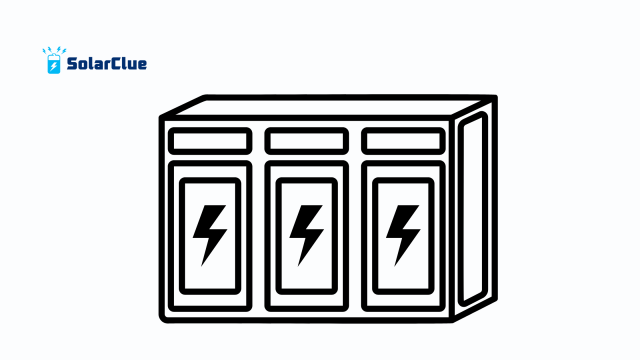
Modern solar inverters often come with smart monitoring apps or web platforms that allow you to track energy production in real-time. This is especially useful for optimizing the performance of your solar power system and quickly identifying any issues.
5. Safety Features
A good solar inverter includes advanced safety features such as:
-
Anti-islanding protection (for grid-tied systems)
-
Overvoltage and surge protection
-
Temperature sensors to prevent overheating
These features ensure your solar setup operates safely and efficiently.
6. Noise Level
Inverters with fans or transformers can generate noise. Look for models labeled as low-noise or fanless if the inverter will be placed near living spaces. A quiet solar inverter for home can make a big difference in comfort.
7. Brand Reputation and Support
Choose a solar inverter from a reputable brand that provides good after-sales support. Brands that have been in the market for several years often offer better quality assurance, firmware updates, and support in case of issues.
8. Grid Compliance and Certifications
A high-quality inverter will have all necessary certifications such as IEC, UL, or BIS to ensure grid compliance and safety. This is also critical if you’re planning to sell excess power back to the grid under a net metering policy.
9. Scalability
If you’re planning to expand your solar power system in the future, opt for an inverter that allows for system scaling. Some inverters can handle extra panels or battery storage down the line, which saves you money on future upgrades.
10. Battery Compatibility
With the rising popularity of energy storage, choosing a solar inverter that is battery-ready or compatible with major battery brands is a smart move. Hybrid inverters are ideal for this setup.
11. Cost vs. Value
While it’s tempting to go for the cheapest option, a good solar inverter should balance price and performance. Investing in a high-quality inverter often results in better ROI, thanks to increased efficiency and fewer maintenance issues.
12. Ease of Installation
The best solar inverters are also easy to install and configure, saving time and cost on labor. Many now come with plug-and-play features or support remote commissioning by the installer.
13. Local Climate Adaptability
Depending on where you live, you might need an inverter that can handle extreme heat, humidity, or cold. Be sure to check the operating temperature range of the inverter you’re considering.
14. Integration With Smart Home Systems
Some modern inverters can integrate directly with your home automation system, allowing you to optimize energy use across smart appliances and devices. This feature is particularly useful for tech-savvy homeowners.
15. Real-World Performance Reviews
Reading customer reviews and real-world case studies is one of the best ways to assess an inverter’s long-term performance. It helps you get insights into installation, service, and post-sales support quality.
Conclusion
To sum up, the answer to what makes a good solar inverter lies in a combination of efficiency, durability, safety features, and smart integration. Whether you’re setting up a new solar power system or upgrading an old one, choosing the best solar inverter will directly impact your energy savings, reliability, and peace of mind. Remember to consider inverter type, warranty, and compatibility with other system components like batteries and monitoring apps.
For more tips, expert reviews, and to explore India’s top solar solutions, feel free to visit us at blog.solarclue.com or check our latest inverters and solar products at solarclue.com. Let your journey to smarter solar living begin today!
FAQs
1. What is the most efficient type of solar inverter?
Microinverters typically offer the highest efficiency since each panel operates independently, minimizing losses from shading and panel mismatch.
2. How long does a solar inverter last?
A good solar inverter should last between 10 to 15 years, with some premium models offering up to 20 years of performance and extended warranty.
3. Can I use any inverter with my solar panels?
Not always. Your inverter must match the specifications of your solar power system and local regulations. Always consult a solar expert before purchasing.
4. Do inverters require maintenance?
Yes, but minimal. Keep them clean, ventilated, and regularly monitor performance through the companion app or interface to ensure peak efficiency.
5. What’s the difference between a regular inverter and a solar inverter?
A regular inverter typically works with grid electricity or batteries. A solar inverter specifically converts solar panel-generated DC power into usable AC power for home or business use.
Let your energy journey begin with confidence—discover smarter solar choices today at solarclue.com and explore more expert tips at blog.solarclue.com.

